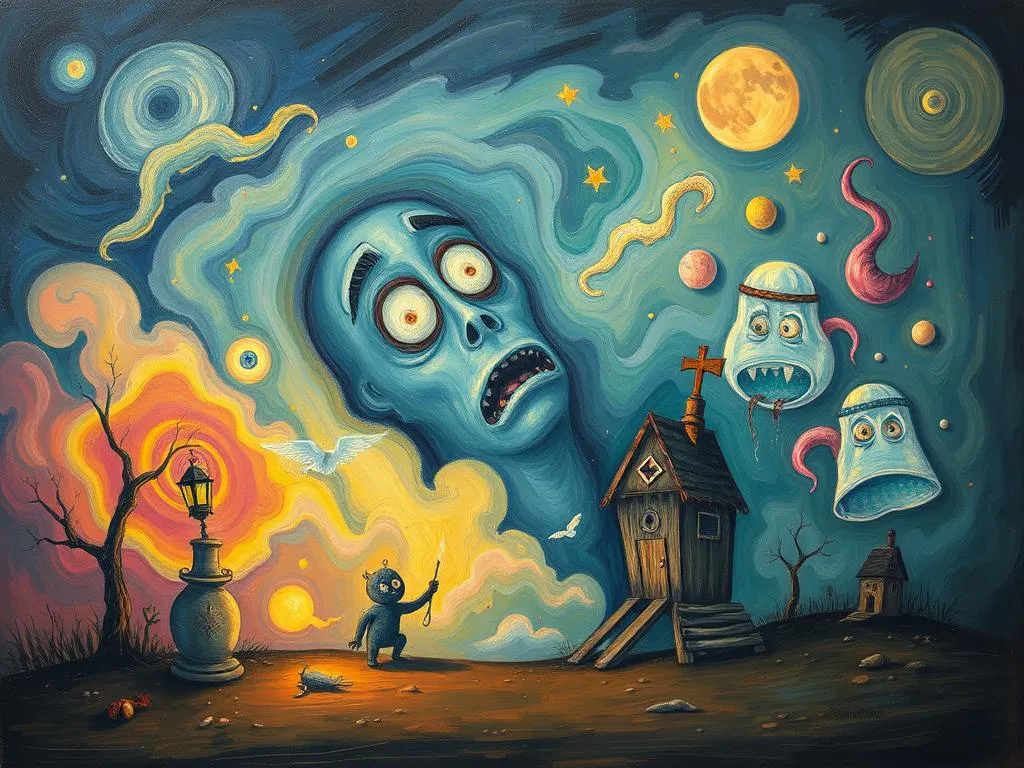
Introduction
Dreams have always captivated the human imagination. Often seen as a window into our subconscious, they can reveal our deepest fears, desires, and unresolved issues. Among these dreams, nightmares hold a particularly intriguing place. They can evoke strong emotions, from fear and anxiety to confusion and despair. Understanding the symbolism behind these nighttime terrors can offer profound insights into our waking lives, helping us navigate the complexities of our emotions and experiences. The very essence of nightmares prompts us to explore why they occur and what they might signify, making the topic all the more relevant to those seeking self-awareness and personal growth.
Symbolism and Meaning
Nightmares often contain rich symbolism, acting as a canvas on which our subconscious mind projects its fears and struggles. Common symbols in nightmares include falling, being chased, losing teeth, and death. Each of these symbols can manifest in different ways, depending on the individual’s experiences and emotions.
Falling, for example, typically symbolizes a loss of control or a fear of failure. It may reflect feelings of insecurity in one’s personal or professional life. When you dream of falling, it might be worthwhile to consider areas in your life where you feel unsteady or uncertain. On the other hand, being chased often indicates avoidance. This could involve running from responsibilities, emotions, or aspects of oneself that one is not ready to confront. Reflecting on what you might be fleeing from can provide valuable insights into your waking life.
Losing teeth in a dream often relates to anxiety about one’s self-image or aging. It can symbolize feelings of powerlessness or a fear of losing something significant. This dream can arise during periods of transition, such as moving to a new city or starting a new job, where one’s self-assurance may feel threatened. Lastly, death in dreams, while alarming, does not always signify a literal end. Instead, it often represents transformation or the conclusion of a particular phase in life. This can relate to personal growth, where old habits or relationships are being left behind to make way for new beginnings.
While these interpretations provide a general framework, it’s essential to recognize that personal context greatly influences the meaning of symbols. The emotions felt during the dream, the events leading up to it, and the dreamer’s current life situation contribute to the unique tapestry of meaning behind each nightmare.
Key Scenarios and Variations
Nightmares can take on a variety of forms, and the scenarios often play a crucial role in shaping their interpretation. For instance, a common nightmare scenario is being trapped or confined. This may suggest feelings of helplessness or entrapment in a particular situation in waking life. It can reveal a desire to escape from responsibilities, relationships, or even one’s own thoughts. The sense of confinement can vary greatly; it may be a small, dark space or an open field where escape feels impossible. Each variation speaks to different aspects of the dreamer’s emotional state.
Another frequent scenario is examinations or tests. Dreaming of being unprepared for a test can reflect anxiety about performance and self-evaluation. This scenario often arises in times of stress, such as before a significant presentation or during a challenging period in one’s career. The fear of being judged or evaluated can manifest through the imagery of an exam, revealing underlying insecurities about one’s abilities and worth.
Natural disasters, such as earthquakes or floods, can also appear in nightmares. These events symbolize feelings of chaos and a loss of control. They may represent overwhelming emotions that the dreamer feels unable to manage. In this case, the specific disaster can provide clues about the source of anxiety—an earthquake may symbolize sudden changes, while a flood might represent emotional overwhelm.
Moreover, some individuals may experience recurring nightmares, which can indicate unresolved issues or persistent fears. The recurrence of certain symbols or scenarios suggests that the mind is trying to communicate something important. Identifying these recurring themes can be a pivotal step toward understanding the underlying emotional struggles that may need addressing in waking life.
Real-Life Connections and Takeaways
Understanding the symbolism behind nightmares can lead to significant personal insights. To connect your nightmares to real-life situations, start by reflecting on the emotions you felt during the dream. Were you scared, anxious, or helpless? These feelings often mirror your waking emotional state. Consider journaling about your nightmares, noting any recurring symbols or themes. This practice can help you identify patterns and connections to your daily life.
Additionally, think about recent events or stressors that may have triggered your dreams. Are there specific situations that evoke feelings of insecurity or anxiety? By identifying these triggers, you can begin to address the underlying issues. For example, if you frequently dream of being chased, it may be time to confront responsibilities or feelings you’ve been avoiding.
Incorporating self-reflection and mindfulness practices into your routine can also be beneficial. Consider engaging in meditation or mindfulness exercises before bed. These practices can help calm your mind and reduce anxiety, potentially leading to more peaceful sleep. Additionally, discussing your nightmares with a therapist or counselor can provide valuable support and insights. They can guide you through the exploration of your fears and emotions, allowing for deeper understanding and healing.
Finally, don’t overlook the power of dreams as a source of creativity and problem-solving. Sometimes, nightmares can provoke critical thought about unresolved issues in your life. Rather than merely viewing them as distressing experiences, consider them as opportunities for growth. Reflect on what these dreams might be trying to tell you and how they can inform your choices moving forward.
In conclusion, nightmares, while often frightening, can serve as vital tools for self-discovery. By analyzing the symbolism and scenarios within these dreams, you open the door to understanding your inner world. Take the time to reflect on your experiences, embrace the insights gained, and remember that the path to understanding oneself can be illuminated through even the darkest of dreams.







